The question is, when does the day begin? Does it begin at 5 am when the first traces of light crack the horizon and I am aware that it is time to get up, or does it begin at 3 am when I lie awake, wondering if I should check for ewes in labor, and for a long time can't sleep again? Today I think it began around 4 am, when I made my tea, marking a space between the intention to rest and the intention to rise, though it all blurs together - thoughts and dreams and worry and wondering and tromping out to the barn in my overalls smelling of sheep that I pull over my pajamas. Any hour of the day or night I might be in my pajamas, so they indicate nothing. Meals, too, at lambing time follow no order and are sometimes forgotten or missed.
Tea is essential and not forgotten. Tea indicates intention. My grandmother and mother taught me this, making tea as a ritual before any important conversation, as comfort, as healing. Very little in life, my grandmother said, is not made better with a cup of tea. It has to be strong - PG Tips or Yorkshire Gold steeped in just-boiling water - with good milk. But I digress.....
Come, in this timeless blur, in this haze of sleeplessness and this weight of anticipating the unexpected, and walk with me from the house to the barn and out to the lambing paddock and I will show you a few things that define this season.
With tea in hand, we head from the kitchen to the mudroom, a large room with piles of barn coats and boots covered with muck, bins of ill-matched work gloves and wool hats stuck with bits of hay, crates of winter squash, potatoes and onions, tubs of rice and flour; two dog beds, and a three-bay sink smelling of iodine where I get hot water for delivering lambs and mix up bottles of milk replacer for the orphans, which we will do now. Two cups of warm water to one scoop of powdered sheep's milk, whisk it up in a mason jar and pour it into baby bottles. Put on your boots. Zip your coat.
Outside the door expect a sudden wall of sound: peepers and wood frogs trilling and quacking from the pond just below the barn. Walk close and you'll see them, thousands of small bodies dimpling the surface like rain, piling and pulsing and sexing and singing in urgent ecstasy. I can tell the temperature of the morning by their volume. It takes some heat for the music to really get going, to ring in your head as if you've spent all night at a club. Today, the chorus is more subdued. Cold sleet is falling from the sky, but only intermittently, which makes it a perfectly lovely spring day in Vermont.
Can I add that this week has been altogether too much? Way too much. It began with the Eclipse, which, despite a ridiculous wind-up, did not fail to disappoint. Stay a little longer, I whispered to the corona, because you are so beautiful, with your sun flare shooting off one edge and a planet shining in the dark zenith, while all around the horizon shines another corona, as if a storm is brewing. Fifty or more people gathered at the farm to watch, and families stayed overnight with us. Peter was away through it all and I wished so much for him to see this beauty, and also to talk to him about how the Eclipse had an ominous dimension, a sense of curse. I was in a haze. I was doing too much. I was missing things.
A storm was brewing inside my favorite ewe, Bruce, who gave birth to triplets just as the Eclipse began. A crowd of visitors had gathered at the door of the lambing shed as I toweled the birth fluids off each fresh lamb, and we watched them lurch and wobble to their feet. One was black with a white circle on its head, another black with a small white sliver, and the third was all black. I can not make this stuff up. Big, Little, and Total, I named them. I didn't know then that there was a fourth lamb that had died inside the womb, and would never make it out. In the melee of people and the imminent performance in the sky, I failed to notice that Bruce never passed her placenta, and by the time I realized two days later that she looked unwell, and had a dead lamb inside, her uterus had clamped down. All week Bruce's life ebbed away, and though the vet and I tried everything we could to get the rotting fetus out, to fight the infection, to hold her together, it was a week of mighty efforts and ultimately failure.
Come. Walk with me across the lawn, past the pulsing pond, into a low door. The orange glow of two heat lamps is all you see at first, and then, at the wall of a lambing pen, a brown ewe lying down and three black lambs playing on her back, tugging on her ears, tucking themselves under her chin. They jump up and cry when we come, then mob our legs, suck our fingers and clothes, beg for milk. Tilt the bottle. They suck it down, pushing their noses hard against the nipples, crazy with hunger. Every three hours they get a bottle, and they are this hungry each time. Bruce tries to stand but she is so very weak. I give her medicine in the mouth and by injection, hook up some IV fluids, try to tempt her with kale and kelp, dandelion and alfalfa, apple and grain. She eats nothing, turns her tired face to the wall, but still she nuzzles her lambs, and calls out when they are out of sight.
Come through the barn to the eastern shed on the other side to check on the pregnant mamas, also fussing with hunger. No one in labor yet. Nothing since the Eclipse, which in itself is odd. A hiatus. Suspension. In another paddock we fork out hay to the mothers who have birthed their lambs, each ewe like an ark with her twins following two by two, a life-giving, flood-bearing ark. In the mud and muck and sacrifice the new life is buoyant and beautiful, jubilant, leaping and running, unstoppable. Wood frogs surge through the barnyard on their way to the pond, mating as they go. I find them in piles of two and carry them, conjoined, to the water.
This week has been too much. Feeding babies at 6 and 9 and 12 and 3 and 6 and 9 and 12 and 3. I believe this adds up to more than a 24-hour day. Somewhere in there Bruce started to slip away, so I carried her outside and tucked hay around her in the dark. Her babies still climbed on her back, which was bony now, her flesh melting. Her breathing is irregular, her pulse weak, her eyes closed. She won't last the night. Tomorrow I will bury her in the giant windrow of sheep bedding in the field. She will give back to the compost pile from where, it might be said, all life on the farm begins and all life ends.
But the week has not been without its joys. Those three black lamb faces squeezed between my hands, cheeks as plush as a child's toy, little faces adorable enough to melt a bunch of sadness. What day is it, what hour? Time strained to breaking to keep these lovely things alive.
The joy of the friends who have stepped up to help - Maddie and Avery and Jed and Sam - offering to taking night shifts to feed babies and check for lambs, helping me fix the tractor tire so I can bury Bruce, Wren my moral support, helping with everything, making me tea. What day is it? What hour? This has ceased to matter.
Last night everyone hanging out at the farm came together in our kitchen to make four foot long fettucine from scratch, tossed with oil and olives and asparagus and cheese, and we boiled artichokes for what seemed like a hundred hours and ate them with Avery's delicious aioli at the table, around a vase of the first forsythia from the garden. Wren and I took a sauna. We dipped water from the pond to pour over our heads, careful not to scoop up the thousands of frog eggs in frothy blooms, birth sacks already squirming with life.




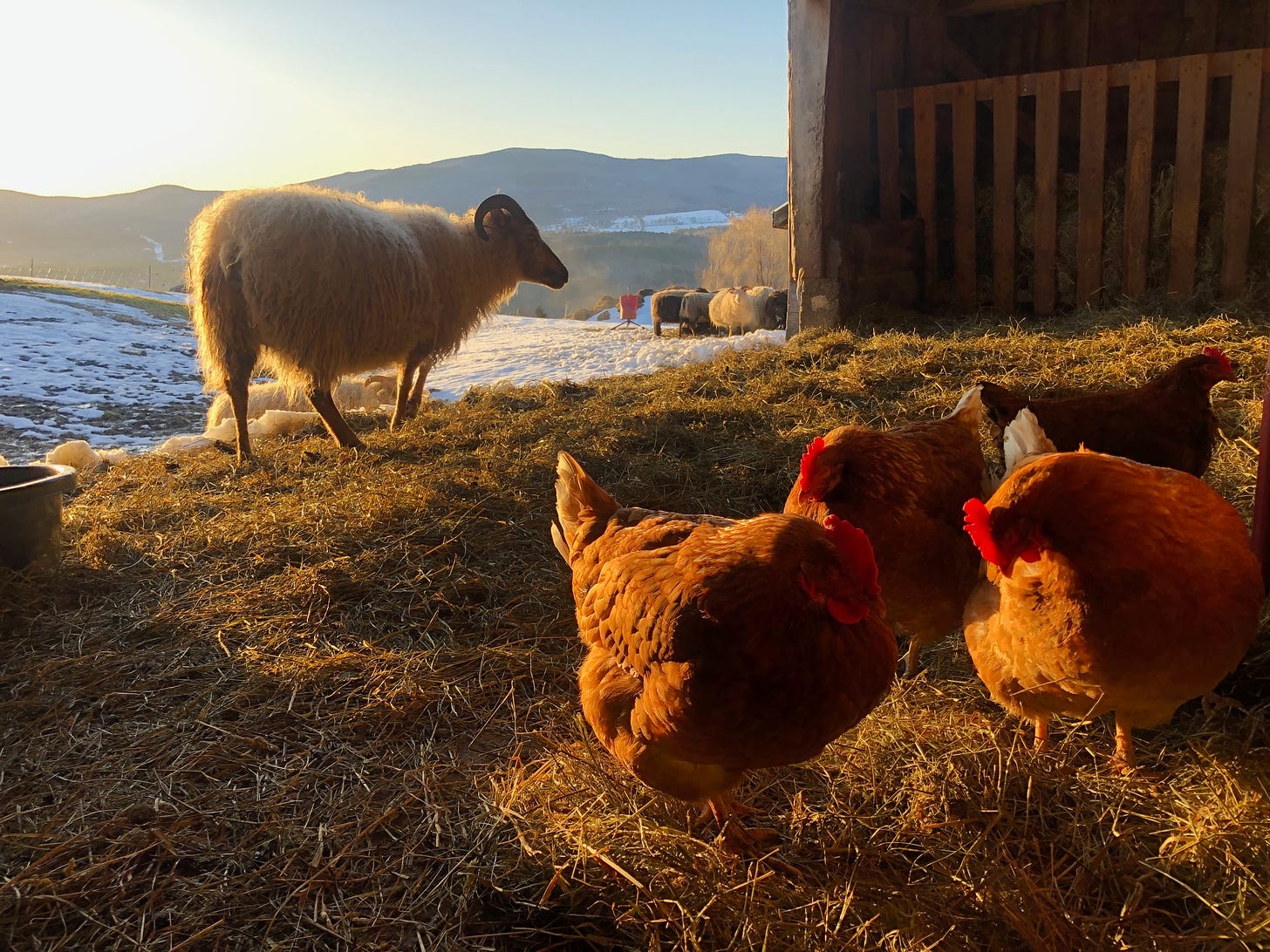
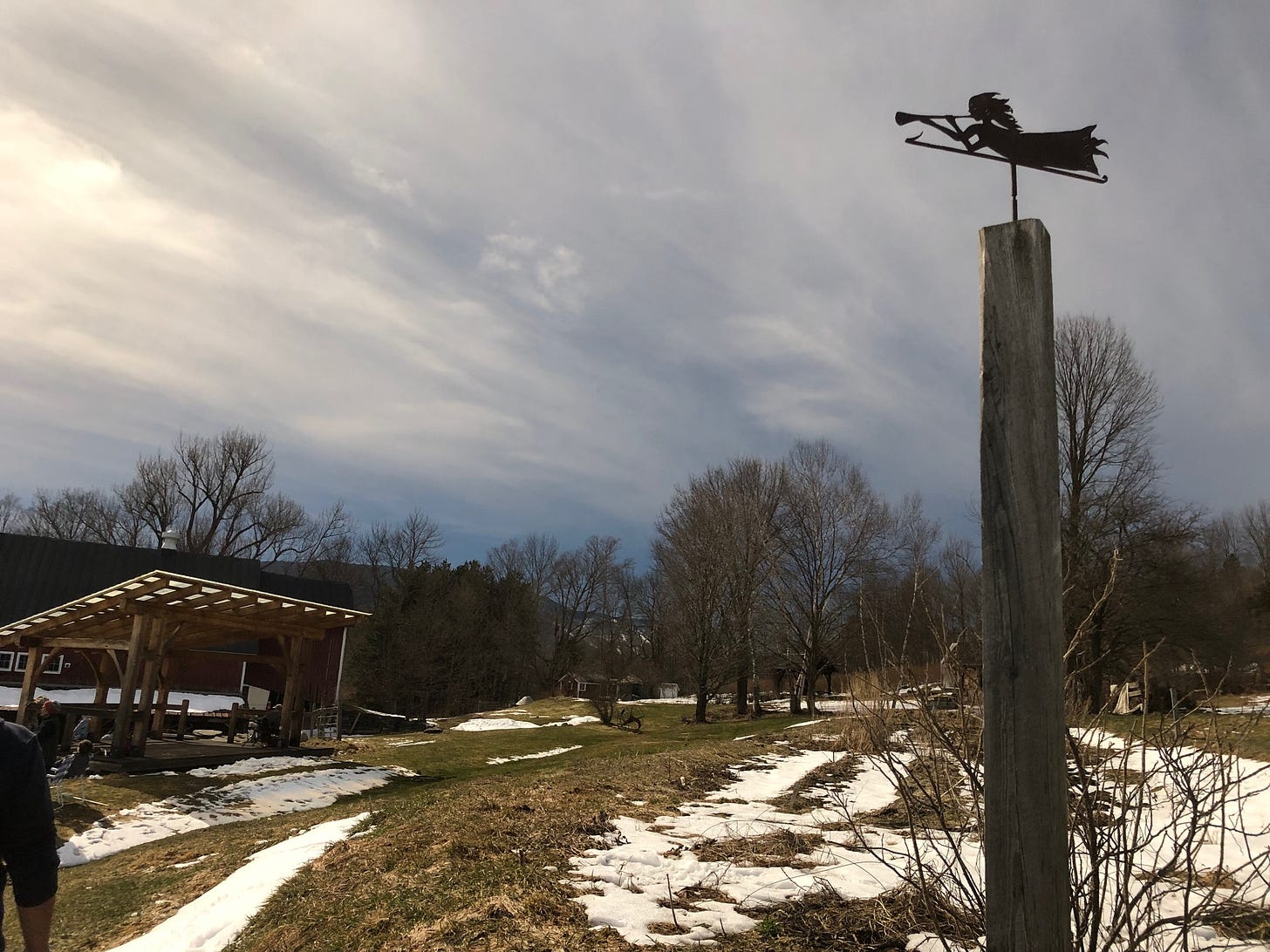
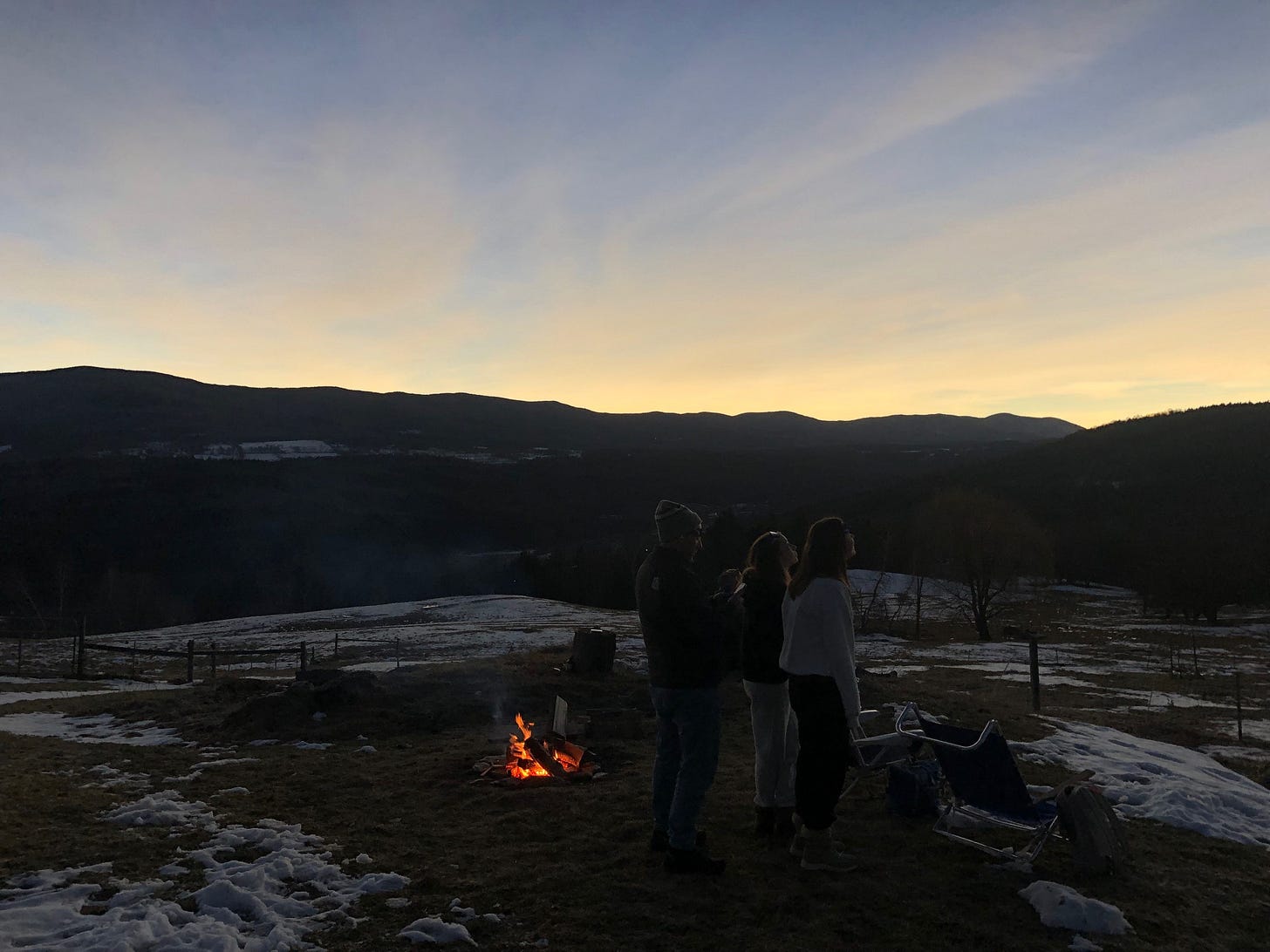
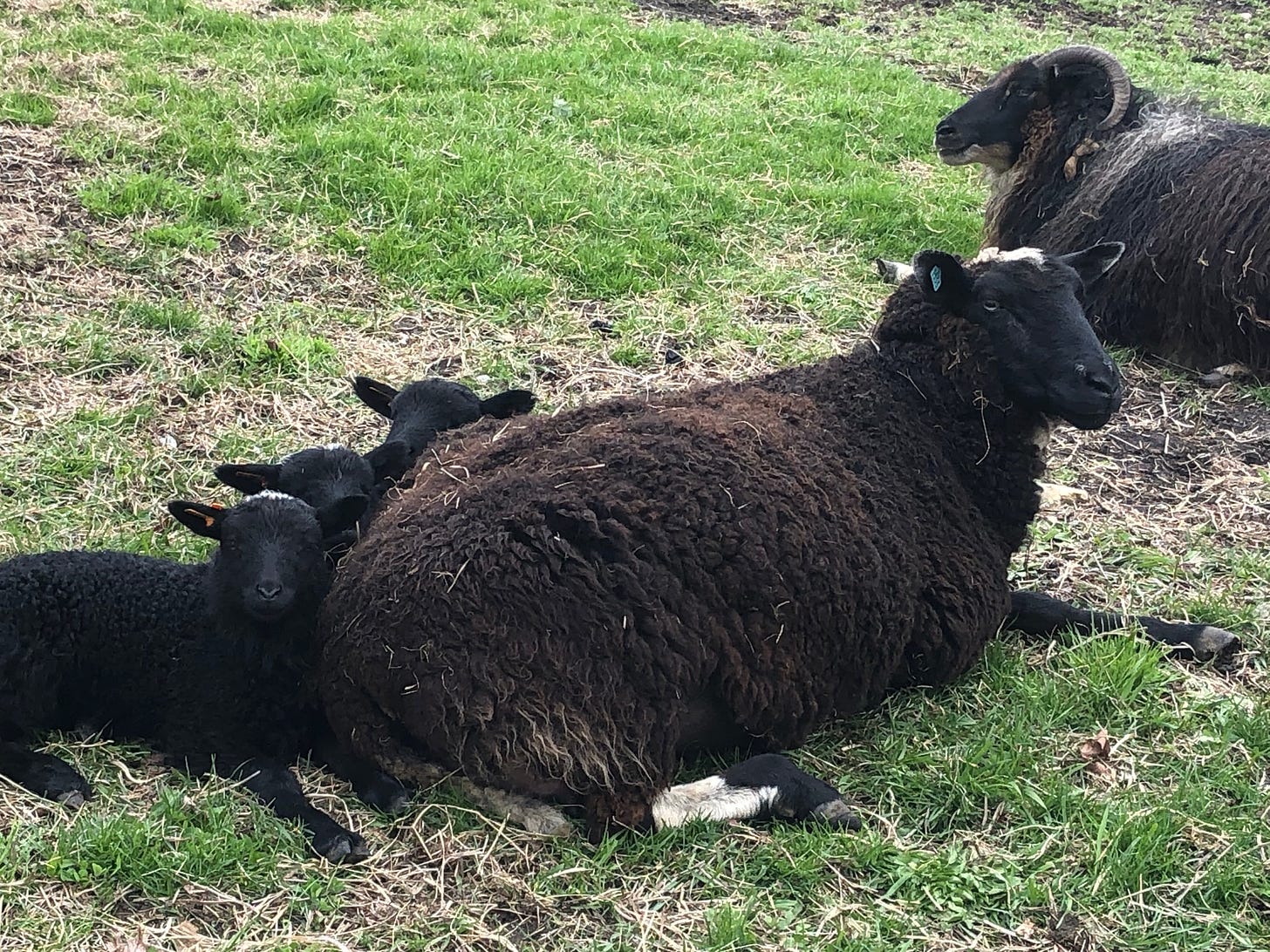
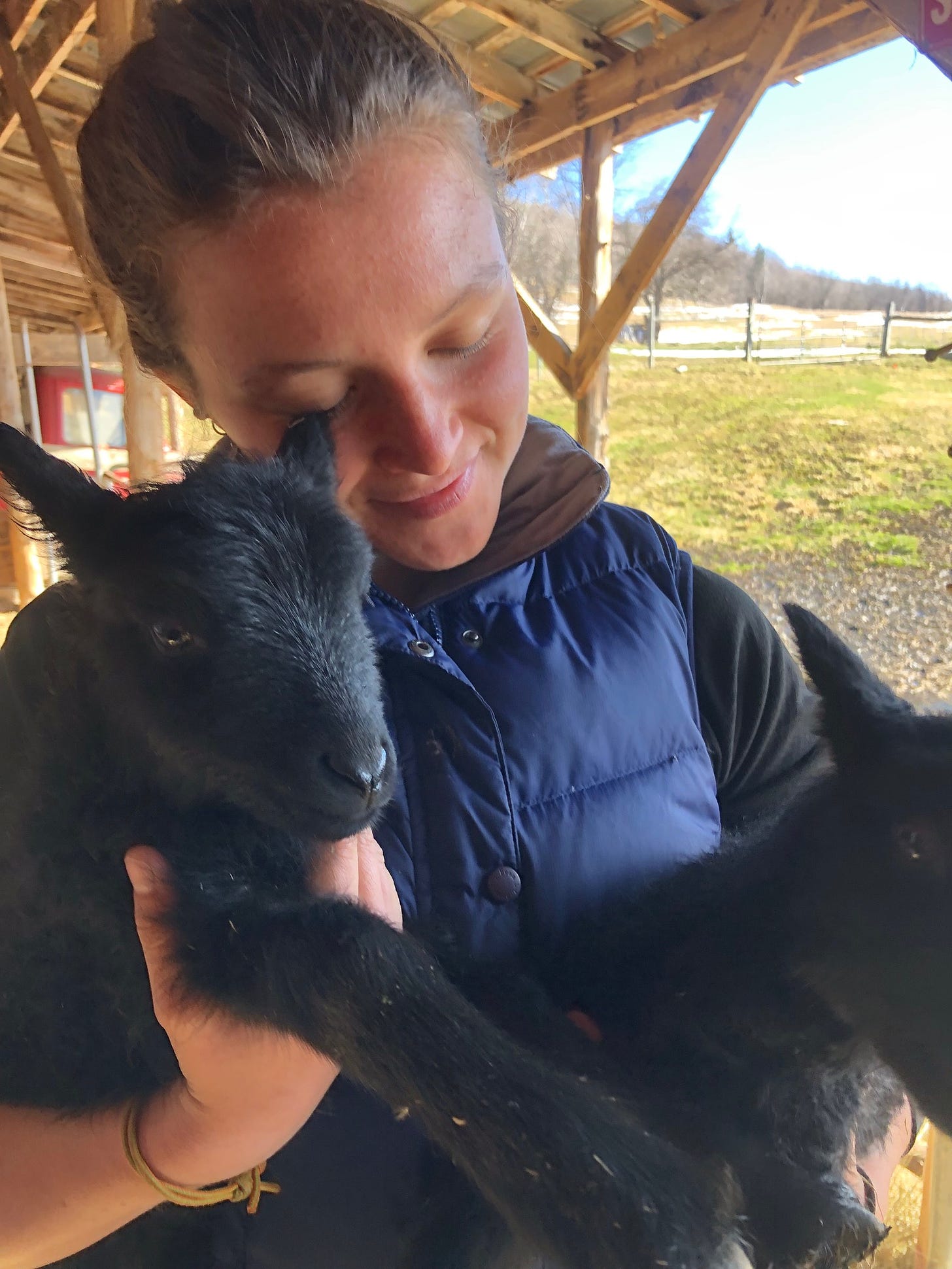
Beautiful writing, Helen. What a way to capture birth and death, all together, with the eclipse holding the space between it all. Thank you for this. <3
Hauntingly beautiful Helen. Sorry about Bruce 😪